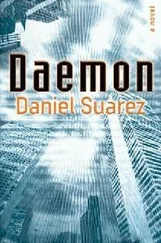Grady guessed from the diagram that Junior had followed the conduit here to find him. He stared at where it disappeared off the edge of the diagram. Where did it lead? There must be some sort of conduit system connecting cells—or at least connecting cells to some sort of infrastructure. Junior had located him somehow. It appeared that sealing the CIE entirely presented an engineering challenge even to the BTC.
In any event, a two-inch-wide conduit was hardly a means of escape.
As Grady studied the diagram further, he could see a small fusion reactor located in the larger CIE enclosure beyond his cell wall. Grady figured the conduit was there to manage atmospheric pressure for the prisoner. Or something like that. Hard to say. And the systems console couldn’t tell him anything about where he was or just how deeply sealed in.
The system’s whole world was this cell. Again, the AI apparently hadn’t lied about the limits of its knowledge. But then surely the results of Grady’s interrogation had to be sent somewhere. There had to be some sort of connection to the outside world.
Grady pursued his inquiry into the subsystems of the CIE with renewed vigor. And before long he located other life-support equipment—including finally the food-synthesis and matter-forming machinery. This equipment was also sealed within the capsule of the CIE but beyond his cell’s walls. The documentation said the food system was capable of producing “deathless” meat, imitation eggs, and just about anything else from organic molecules synthesized from still other systems (and, more disturbingly, processed waste).
He wondered if this was a self-contained biosphere. If so, it would be impressive—and would certainly be a requirement of long-distance space travel and colonization of…
He was getting off track. Enthusiasm for the BTC’s technology was a temptation he couldn’t afford right now. He got back to his studies.
An on-demand manufacturing facility was used to produce any components necessary for continued operation within the CIE—and to repurpose inorganic waste, to fix malfunctioning components—but also apparently to create perquisites for cooperative prisoners. Which was something Grady had never been.
Once he activated the nutrition and manufacturing systems, their user interfaces “grew” out of the wall, too, in the form of ledges and narrow openings. These Grady controlled from diagnostic screens. Apparently, had he not resisted every single moment, his AI could have given him some level of comfort and pleasure.
He cycled through the list of luxuries.
The food options were surprisingly comprehensive. He cringed at the sheer volume of choices in the same way one might cringe at a bus station café menu that offered Thai, Italian, Mexican, Indian, and French cuisine all at once.
He decided to try a bowl of chicken ph’o —a Vietnamese broth-and-noodle dish that he figured would be an easier start for his digestive tract. After he selected it from the maintenance console, a percentage meter started incrementing next to the word.
A café with a progress meter did not bode well.
But in a few minutes a generic-looking gray bowl slid out from the wall on a gray shelf. The bowl contained a steaming broth aromatic with spices. As Grady caught the scent, his appetite was piqued. He grabbed a nearby gray spoon and tentatively tasted the broth.
It was delicious.
Whether it was his captivity or his starvation or whether it was actually good he couldn’t tell, but the phó’ reminded him of a cheap hole-in-the-wall Vietnamese place he used to frequent when he was a starving student up in Albany.
Grady looked down at the EAP worm. “Not bad, Junior.”
The synthetic worm turned toward his voice.
Grady eased down onto the floor next to it. “Not bad at all.” He ate contentedly.
Refreshed, afterward Grady walked his cell again, circling the wire hanging down from the domed ceiling.
The wire had to lead somewhere. It hadn’t been there before Junior arrived—which meant Junior most likely brought it in with him. And that meant it had to have a purpose.
Grady now stared straight across the room at the still open diagnostic port in the wall. The wire hung just about low enough…
He walked over to the wire and carefully grabbed the connector at its end. Grady then guided it slowly over to the diagnostic port where he’d used the iris scanner. A quick peek confirmed the presence of a small socket next to the scanner. He studied the connector on the wire’s end.
They looked like a match.
He tugged at the wire, bringing it up to the socket, and found that it reached with little slack. He clicked the connector into the socket.
A loud pop sounded overhead, followed by several beeps. These continued for several moments at intervals.
Then Grady heard a man’s voice, the words formed with a posh Indian accent. “With whom am I speaking, please?” Then the same voice in another language, “Wo yu shui shuohua?”
Grady was immobilized with shock—and then suspicion. He remained silent.
“Avec qui je parle? With whom am I speaking?”
Grady moved to disconnect the line.
“Do not be afraid. I am a prisoner like you.”
Grady gripped the socket, ready to pull it out.
“Je suis un prisonnier comme vous.”
“How do I know you’re a prisoner?”
“American. What year were you taken, my friend?”
Grady took a deep breath. “How do I know this isn’t a trick?”
“Hmm. I believe the operative question is: How can you be sure that I am human? Conversely: How can I be sure you are human? It is a reverse Turing test we are wanting.”
Grady pondered this.
“While I cannot rule out the possibility that my polymer worm has been captured by an AI, it would be unlikely. AIs are unimaginative creatures.”
Grady looked down at Junior. “You built this thing—from BTC technology?”
“Not I, but you are getting ahead of yourself, my friend. You have not determined whether to trust me, remember?”
“Oh.” Grady nodded. “Right.”
“How do we prove our humanity in a world where generalized artificial intelligence is commonplace?”
“I’m not sure I know.”
“In such a case we have found it useful to focus on areas where human intellect differs from that of machine intellect—specifically those areas concerned with bodily function.”
“We? There’s more than one of you?”
“Ah, first things first, my friend. Let us determine our humanity to both our satisfactions.”
“Using bodily functions. What? Fart jokes?”
“Something similar. Let me start. Please describe for me the fragrance of your wife’s genitalia.”
Grady scowled. “What the…? What the hell is your problem? How long have you been in here, anyway?”
“Ah, but don’t you see? I am now satisfied that you are human. Machine intelligence in its current state is indeed more powerful than the human brain—but narrowly focused. Unsubtle. No AI to which I posed that question would fail to describe the fragrance of a woman—oblivious to the social cues that would, between men, result almost certainly in fisticuffs.”
Grady looked uncertainly at the ceiling. “Okay. I guess that makes sense.” He thought about it some more. “And I can’t recall if I’m married, anyway.”
“I am sorry to hear your memory has been damaged. Are you at least satisfied with my humanity?”
Grady realized the guy was just strange enough to seem certifiably human. An eccentric genius no doubt. Grady felt relieved and happy to be talking to another human being. “Yes. In fact, it’s great to talk to you.”
Читать дальше












